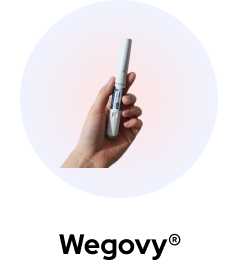Ozempic, the brand name for semaglutide marketed by the company Novo Nordisk, is not only effective for the treatment of type 2 diabetes in adults. Thanks to its side effects, it may also have positive benefits in the treatment of weight management, especially for those suffering from obesity.
However, like all medications, there are a number of risks and side effects you should be aware of.
In this article we’ll cover:
- What Ozempic is
- How Ozempic may help with weight management
- Whether or not it’s safe to use
- The common side effects of the drug
- Our best tips for managing common side effects
- Whether or not you should use Ozempic to aid you with weight management
- Frequently asked questions.
So, whether you’re considering taking Ozempic or want to learn more, read on!
What Is Ozempic?
Ozempic, a brand name for semaglutide, is part of a larger class of drugs known as glucagon-like peptide-1 (GLP-1) receptor agonists. These receptor agonists imitate the action of the GLP-1 hormone in the body. This hormone naturally helps your pancreas keep insulin levels balanced, as well as slowing down the body’s digestive process.
While Ozempic was initially created as a treatment for type 2 diabetes, studies and anecdotal evidence have shown that it can also be a highly effective tool in aiding weight management. It is also effective at reducing the risk of major cardiovascular events and heart disease, including heart attack, stroke, hypertension, or death.
You may also see semaglutide marketed under brand names Wegovy or Rybelsus.
Currently in Canada, Ozempic is available by prescription only, and may be approved for the treatment of type 2 diabetes or for assistance with weight management in those with a BMI of 27 or higher.
Ozempic is self-administered by patients with an Ozempic Pen — similar to an EpiPen — as a subcutaneous injection (ie, beneath the skin into the fatty layer of tissue). The dosage of Ozempic will vary depending on a number of personal factors.
How Does Ozempic for Weight Loss Work?
Currently, Health Canada has only approved Ozempic to be used for weight management in those with a BMI of at least 27, meaning that if you don’t meet this criteria you won’t have access to the drug.
However, for those who have been struggling to manage their weight using traditional methods, the data shows that Ozempic, along with lifestyle changes, may be beneficial.
The primary ingredient of Ozempic, semaglutide, works by boosting the effects of the naturally occurring hormone GLP-1. These help to control the hunger centers of the brain, suppressing appetite, and slowing the rate at which the stomach empties.
This lower level of hunger and prolonged feelings of fullness, in addition to increased satiety following meals, may help reduce your caloric intake and put you in a calorie deficit.
You should note, however, that your health insurance will only cover treatment if Ozempic is being prescribed for type 2 diabetes.
Is Ozempic Safe?
According to medical professionals, Ozempic has been proven to be safe and most people tolerate it well. However, it is known to have a number of side effects and contraindications, which is why you should discuss with your medical team before commencing the drug.
It’s important that you disclose any relevant information to your medical team, such as your medical history, any prescription medication you’re currently taking, and lifestyle habits.
If you have a personal or family medical history of medullary thyroid cancer (MTC), pancreatitis, or gallstones, it is highly recommended to avoid taking Ozempic, as you may encounter problems, such as the chance of experiencing adverse complications.
According to clinical trials performed on mice using semaglutide, this resulted in the development of thyroid cancer in the mice. However, it’s unknown whether or not similar reactions would occur in humans, so best advice is to avoid Ozempic and other semaglutide prescriptions if you have a history of MTC.
Other more serious side effects may include:
- Pancreatitis
- Kidney problems
- Changes in vision
- Gallbladder issues
- Allergic reactions (including swelling of the face, tongue, throat, or difficulty breathing following administration of Ozempic).
If you experience any symptoms of the more serious side effects listed, discontinue use of Ozempic immediately and contact your medical team, or visit the ER at your local hospital.
Common Side Effects of Ozempic for Weight Loss
There are some commonly reported side effects of Ozempic, often when the drug is started, or when the dose is increased, which is not uncommon with a new medicine. However, the majority of these dissipate with continued use, and as your body adjusts to the drug.
If your symptoms persist, or you’re concerned, be sure to contact your medical team.
Nausea and Vomiting
Ozempic may cause nausea and vomiting, especially during the first few weeks of use.
Diarrhea
Ozempic may also cause diarrhea, which can be uncomfortable and inconvenient. Your medical team or a pharmacist may be able to recommend over-the-counter medications to reduce these effects.
Stomach Pain
Stomach pain or constipation is another common side effect of using Ozempic. Drinking plenty of fluids can help reduce the sensation, as can common pain relievers.
Fatigue
Fatigue is another common side effect of Ozempic, which should subside after a few weeks once your body becomes accustomed to the medication.
Changes to Your Face
In rare cases, Ozempic may cause changes in the shape or color of your face. This is most common among those taking high doses.
In cases where you lose weight rapidly, this may result in the appearance of sagging skin, especially around your face. This is known as “Ozempic Face” and is not something to be particularly alarmed by.
Bear in mind that when you are planning your weight management, aiming to lose around two pounds a week is considered both safe and sustainable. More than this may lead to more drastic changes associated with Ozempic Face.
Low Blood Sugar
Ozempic can potentially result in hypoglycemia, especially if you are taking insulin or another form of medication for diabetes. Be sure to consult with your medical team to help prevent this.
Hair Loss
Hair loss is a potential side effect of taking Ozempic, however it is usually temporary and will stop when the medication is discontinued.
Tips to Manage Common Side Effects of Ozempic
To reduce the potential side effects of Ozempic, there are a few simple things you could do.
- Drink plenty of fluids – Staying hydrated can help reduce nausea and vomiting associated with Ozempic.
- Eat regular, balanced meals – Healthy and nutritious meals on a regular basis can help regulate your metabolism and decrease the risk of side effects such as nausea, heartburn, or other uncomfortable gastrointestinal issues.
- Take with food – Ozempic should be taken with food, as this helps absorb the medication into your body. Eating a small meal before taking the medication can also reduce side effects like nausea and vomiting.
- Monitor your blood sugar levels – If you’re taking Ozempic in combination with insulin or another diabetes medication, it’s important to monitor your blood sugar levels regularly.
Should I Use Ozempic for Weight Loss?
Ozempic can be an effective tool for weight management, but it should always be used with caution and in combination with healthy lifestyle changes. Remember, Ozempic is not a substitute for diet and exercise.
To maximize the benefits of treatment, it’s important to follow a healthy diet and exercise regimen while taking the medication. Ozempic should only be taken under the supervision and guidance of your medical team.
Key Takeaways
Several studies, including this 2022 study, have indicated that Ozempic (or semaglutide), has the potential to not only treat people with type 2 diabetes, but also be used as an effective tool to help weight management.
However, Ozempic isn’t suitable for everyone, and you should discuss your full medical history and circumstances with your medical team before starting the drug.
There are also a number of unpleasant side effects and contraindications associated with Ozempic. Anyone considering starting a course of the drug should discuss the details with their medical team, and be fully aware of the pros and cons.
Remember that in Canada, Ozempic is only approved for use in the treatment of those with type 2 diabetes, or for assistance with weight management in those with a BMI of 27 or over.
Ozempic for Weight Loss Side Effects FAQs
Can Ozempic cause weight loss?
Yes, Ozempic can assist with helping you achieve your weight management goals. This has been demonstrated in clinical trials, which showed that patients with a BMI of 30 or higher, or a BMI of 27 or higher with a weight-related ailment lost an average of 3.6–7.2% of their body weight after taking Ozempic for 24 weeks.
Are there foods to avoid while taking Ozempic?
No, there are no specific foods to avoid while taking Ozempic, but it’s important to follow a healthy diet and exercise regimen to maximize the benefits of treatment. Omitting high-fat and high-sugar food and drink from your diet may also help reduce some of the side effects of the drug, including nausea.
How long do Ozempic side effects last?
Most side effects associated with Ozempic are usually minor and resolve without intervention over time. However, if any symptoms become severe or persist, it’s important to contact your medical team.












 (US)
(US)